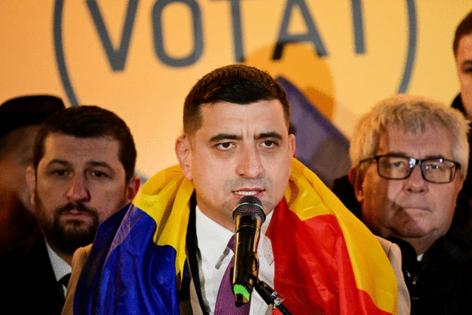Romania far-right leader scores first-round election win
Published in Political News
A far-right Romanian opposition leader who aligned himself with Donald Trump secured a first-round victory in a repeat presidential election, dealing a blow to the Black Sea nation’s ruling establishment amid outrage over persistent corruption and poverty.
George Simion of the ultranationalist Alliance for the Union of Romanians secured 40.2%, Romania’s election authority said Sunday, with 88% of poll locations counted. Former liberal party leader Crin Antonescu, backed by mainstream parties, had 21.2% backing, while Bucharest Mayor Nicusor Dan scored 19% — though with votes in urban areas and Romania’s diaspora left to be counted, the final results were still unknown.
The contest was the second attempt to choose a president after the shock victory of a far-right fringe candidate last year prompted accusations of Kremlin interference and the high court’s cancellation of the ballot. The unexpected first-round victory in November of Calin Georgescu, who has been banned from running in Sunday’s race, prompted Romania’s biggest political crisis since the fall of communism.
Simion attributed the turn against the establishment to lasting poverty that’s driven millions of Romanians out of the country in search of work. He said he also benefited from the current government’s lack of assertiveness in protecting Romania’s interests in the European Union and beyond.
“One of the reasons why the government and the establishment is not supported here in Romania is the fact they didn’t have a strong enough voice inside the EU,” Simion said in an interview in his office in Bucharest shortly before polls closed. “They did whatever the others wanted, the big powers wanted.”
But much is at stake, with Romanians deciding whether the country maintains the reliably transatlantic course it’s pursued for the three-and-a-half decades since the collapse of Nicolae Ceausescu’s regime, or turns to anti-establishment forces that have challenged the EU’s liberal order.
Although most polls predicted a win for Simion, they indicated that he could face stiffer resistance in the runoff against Antonescu or Dan, both of whom would be in position to potentially consolidate support of voters who want to maintain Romania’s path of integration with the rest of Europe.
Dan expressed confidence that votes from Romanians abroad would give him an edge. A loss for Antonescu, who had the backing of Prime Minister Marcel Ciolacu’s coalition, could deal a blow to the government.
Allegiance to Trump
Looming over the contest was President Donald Trump, whose administration took a keen interest in Romanian politics amid protests over the annulled vote. An ultranationalist head of state, who would represent Romania at European Union and NATO summits, could add to far-right forces across the EU tearing at the seams of the bloc’s liberal institutions.
Speaking to reporters earlier Sunday, Simion said he was an adherent to Trump’s movement — and delivered a raft of accusations over alleged voting irregularities, including millions of dead people on voter rolls, and accused a number of broadcasters of spreading “lies.” He didn’t produce any evidence to back up his claims.
The country’s top court annulled last year’s vote and ordered a repeat over suspicions of Russian interference in Georgescu’s campaign. The court decision, which Simion called a “coup d’etat” has come under fire from far-right groups as well as Trump allies. US Vice President JD Vance cited it as an as example of democratic backsliding and alleged discrimination against far-right politicians in a speech to the Munich Security Conference in February.
In a message published on the Facebook account of the US Embassy in Bucharest this week, Vance was quoted urging Romania to ensure that “the voice of the people is heard as it’s the sacred foundation of democracy.”
Still, a senior US official, Federal Election Commission Vice-Chairman James “Trey” Trainor, warned of outside meddling in Romania’s democracy. Part of a high-level delegation from Washington, Trainor said Saturday that it was “very clear” that last year’s contest was manipulated.
Simion has said his party, the AUR, counts Italian Prime Minister Giorgia Meloni as a European ally. The far-right leader has vowed to end assistance to Ukraine, though — marking a contrast with Georgescu, who has praised Vladimir Putin — Simion has denounced the Russian president as a war criminal.
Romania is the EU country that shares the longest land border with Ukraine and has helped facilitate millions of grain exports from the war-battered nation through its Black Sea ports.
Romania’s president is not a figurehead akin to heads of state in other European countries. Elected to a five-year term, the president represents the country at EU and NATO meetings and is commander-in-chief of the military, though the prime minister leads the country’s government.
_____
©2025 Bloomberg L.P. Visit bloomberg.com. Distributed by Tribune Content Agency, LLC.




























































Comments